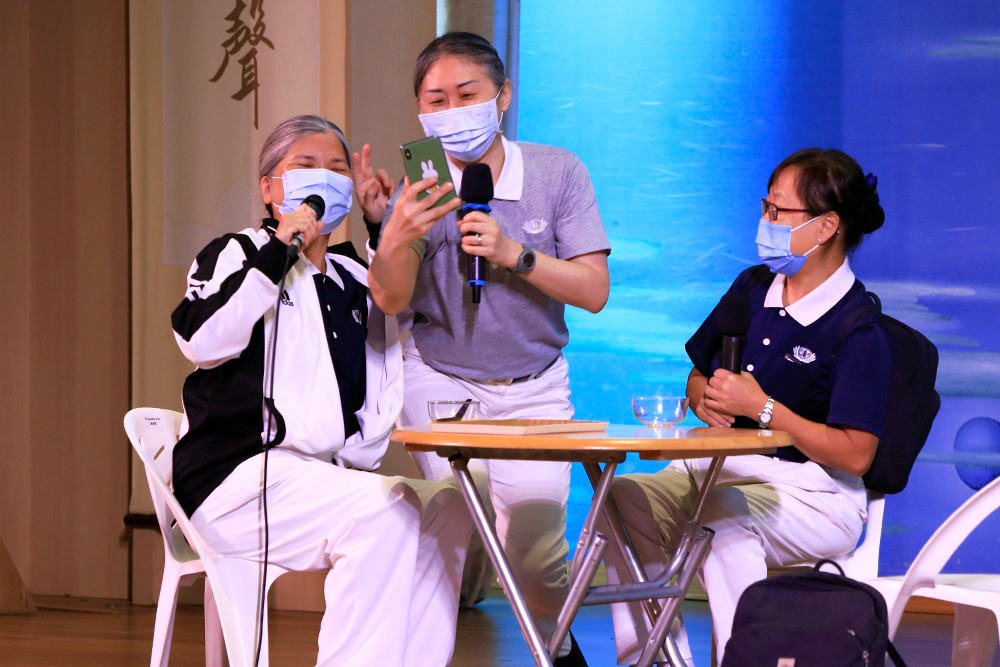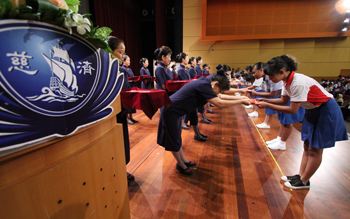Senior charity home visit volunteers are invited to share their experiences with those interested in participating in charity work. The picture above shows volunteer Teh Joo Hoong introducing the five guiding principles of Tzu Chi’s charity home visit programme.
“Sisters, I don’t have enough money to cover my living expenses. Can the cash aid be increased?”
“No problem, we can help you with that.”
“Sisters, drinks for all of you?”
“Oh yes. By the way, shall we take a photo together? I can upload it onto Facebook!”
“Sister, I am down with flu and having a headache. I’m not sure which doctor to go to.”
“(If) it’s just a headache, there’s no need to visit a doctor. Just take some Panadol.”
The dialogues in the skit depicting the charity home visits were lively and amusing, creating an outburst of laughter amongst the students. Yet the skills of dealing with these seemingly mundane everyday conversations are in fact, details that are easily overlooked during home visits.
To encourage more participation from public members, the foundation organised an “Introductory Course on Conducting Home Visits” on 21 May 2022 to introduce Tzu Chi’s principles on charity work and the basic etiquette of conducting home visits. The course was designed to equip interested yet inexperienced participants with the essential knowledge and guidelines of home visits quicker. The volunteers also hoped that the course would enable the participants to master the fundamentals faster when visiting care recipients with experienced home visit volunteers on Tzu Chi’s monthly Charity Day.

The skit performed by actual home visits volunteers is realistic and brings a lot of laughter to students. It also helps the students pick up the essential experiences of home visits.
Eliminating Suffering and Forming Good Affinity
Students were amused by the skits and picked up the experiences of home visits volunteers very quickly. Home visit volunteer Low Ching Cheow explained the procedures and preparation works required for the Charity Day within the skit. The students took the opportunity to find out the basics of home visits to pay attention to and learned what to do and what not to do.
To Tzu Chi volunteers, seeing a care recipient is not just literally visiting the person casually. One must be empathetic and put oneself in the shoes of the care recipients and understand the difficult situations they are in. While providing temporary assistance to help the care recipients tie over an obstacle, one also needs to sincerely accompany and care for them. It requires one to find the most appropriate public resources that can assist them, all through the most respectful arrangement.
The “Introductory Course on Conducting Home Visits” gave 91 participants a basic understanding of the principles and guidelines of Tzu Chi’s home visits.
During the 3-hour course, home visit volunteer Teh Joo Hong shared the ideology of Tzu Chi’s charity work and home visit programme. He also explained the five principles of Tzu Chi’s charity work – directness, focus, pragmatic, timeliness and respect. It was meant for people to understand better that home visiting is not just targeting one care recipient, nor is it an isolated programme. Instead, it is a provision of holistic care not just for the individual but also for the whole family throughout the journey.
Joo Heng said that the suffering of one person is often the suffering of an entire family. Therefore, when the suffering cannot bring themselves out of the misery, people who are blessed must go to them. Tzu Chi’s charity work adopts a two-pronged approach – educate the rich to help the poor and educate the poor to be spiritually wealthy. Tzu Chi aims to ignite the love between the poor and the rich by building a connecting bridge between them both.
Tzu Chi Singapore currently serves about 700 care recipients. Every reported case is cared for and evaluated by home visit volunteers in person. Each case recipient has a different background and unique challenges. It is, therefore, not difficult to imagine the volunteer’s hectic schedule.
Teo Geok Yong, a Tzu Chi commissioner, shared that Tzu Chi’s charity assistance covers a broad scope such as living expenses, medical assistance, education grants, Seeds of Hope Programme and Tzu Chi Renal Support Programme.
Besides doing a detailed assessment, volunteers must also make appropriate ad-hoc decisions. Some care recipients may reach out to the volunteers for urgent financial aid to pay for their medical expenses or repair fees etc. Upon verification of the need and urgency of the matter, volunteers will, in their best ability, expeditiously provide “emergency funding” or provide medical care at the recipients’ home or house cleaning and repair etc.
Through the home visits, some cases were found to be not in need of financial assistance but needed to be heard. They need to have people who are willing to spend time with them, care for them and render timely moral and spiritual support to them. All these are simple yet crucial ways to care for a person.
Tzu Chi commissioner Teo Geok Yong sharing with the students the various charity assistance provided by Tzu Chi, including subsidies for living expenses, medical assistance, education grants, Seeds of Hope Programme and Tzu Chi Renal Support Programme.
Turning Thoughts of Kindness into Action
One of the key learning points is that every single part of the process will require one to listen, see, do and walk into the homes of the care recipients personally. A student, Tan Chow Fei, affirmed, “I have heard of Charity Day previously, but it did not hit me. After today’s class, I can feel the spirit of Tzu Chi’s home visits. I just realised that Charity Day is such a meaningful day.”
Ten years ago, Chow Fei joined the Tzu Ching Youth Camp in Jing Si Hall. It had since been ten years after the camp ended. She finally returned to Tzu Chi on this day to renew her affinity. She even brought her husband along. Chow Fei said, “Instead of just feeling emotionally touched, why not act on it? We should contribute physically.”
As a former teacher, she recalled once taking her students to visit the elderly living alone. However, those were just one-time charity services which do not provide active listening nor meet the elderly’s needs. Chow Fei shared, “I still remember one elderly telling us not to show up again as there were already a lot of people gifting them presents, instant noodles, biscuits and lots of Milo. That elderly even asked if we want to have some.”
Chow Fei complimented the long-term and consistent care provided by Tzu Chi and acknowledged the unwavering sincere companionship given to care recipients, making the monthly Charity Day very important.
She said, “Volunteering to do home visits is not just about the joy one derives from doing it, it also requires one to show respect for the care recipients and be grateful even when giving. That is called true completeness. Today’s course has helped me understand the concepts of home visits bit by bit.”
Chow Fei has registered to participate in the home visits on the next Charity Day, hoping to contribute to helping people who are suffering and walking the Bodhisattva Path with everyone.
A jam-packed 3-hour course with audiences listening attentively to the sharing by the home visit volunteers.
Being Able to Help is a Blessing
Student Woh Kok Meng and his wife Heng Seow Ching had previously watched the performance of “Dharma as Water” Sutra Adaptation in 2013 and were deeply moved. Since then, they have always paid attention to Tzu Chi’s updates. At the beginning of this year, they reached out to Tzu Chi on their own accord. Starting with delivering goods for the Festive Charity Fair and subsequently signing up for the introductory course on conducting home visits. Their wish is to deepen their understanding of Tzu Chi’s teachings.
Kok Meng said that whilst the course schedule is tight, he has learned a lot about home visiting, including dressing up wounds, politely declining food from care recipients and refraining from discussing cases publicly.
“As what Master Cheng Yen said, home visits are opportunities for us to help others. Although one may not be financially rich, having the ability to help others is also a blessing to oneself. It is very fortunate for us to be able to live in Singapore, and we must always have a heart of gratitude and contribute to our society!” shared Kok Meng.
Apart from conducting lessons on the stage, students were also arranged into smaller breakout groups for discussion and clarification of any doubts.
Another student, Leong Yin Shong, agreed that the volunteers should collectively discuss the case and record any key points after each home visit. This approach should be more prudent and objective. She added, “To the care recipients, we are all strangers who are not familiar with each other. It is good to learn the basic concepts in class before conducting the home visits.”
Yin Shong is a semiconductor engineer who often travelled abroad for work. During the COVID-19 pandemic, she reflected on her life goals and it prompted her to resolutely choose to retire and change her life path. Coincidentally, she saw Tzu Chi’s website and proceeded to sign up for today’s course.
Yin Shong said excitedly, “I have already filled up the form, and I am going for a home visit on July 5th!”
The introductory course ended at 5.30 pm. Having completed the content-rich course, 91 students had much to gain. At the end of the course, more than 90% of the students were willing to participate in the subsequent home visits. For as long as there are people who are poor, sick, orphaned and disabled, Tzu Chi volunteers will never stop reaching out to them.



